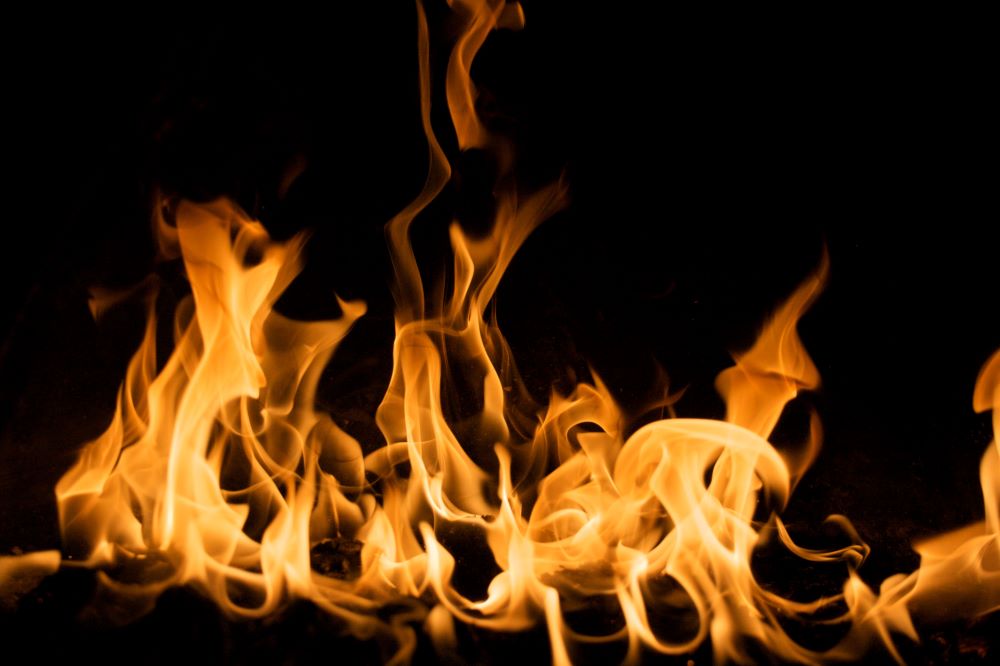
(Unsplash/Guido Jansen)
"Look!" I unthinkingly prompted my 8-year-old nephew as we drove past the flagpole in front of a local daycare last week. We had just finished his homework, a worksheet about Memorial Day, before we set out for the local playground. "What do we call that?"
I could see his mind searching for the word we'd learned from the worksheet as I looked at him in the rearview mirror. After a few moments, the word surfaced in his mind. "Half-mast?" He replied with the uncertainty of a newly learned word. “That’s right.” I assured him. "That flag is at half-mast."
For a split second, I thought to myself: It's only Thursday. Why are they marking Memorial Day already?" Then I remembered: Uvalde. The school shooting.
Of course, it could have been the Tops Market in Buffalo, too, or the church shooting in Orange County, California. As I wrote on these very pages six years ago: "The flags are at half-staff again."
Then, I argued that the virtue of hope might sustain us for the long haul. "Hope sustains us and allows us to see more clearly, no matter how blurry the signs of the times might seem. … If we can keep that hope before our eyes, we will see clearly. Our hearts will still ache, and rightfully so, at the sight of flags at half-staff. But we will remember that we have a role to play in healing the heart of humanity, a part to play in the life of faith, hope and love alive in this world."
With creativity, the Spirit invites us to reimagine them in each new moment to meet the needs of the world and serve the Reign of God.
I still believe this — that hope prevails — but I have to wonder if the endless list of shootings proves me wrong. I have to grapple with the fact that news of the war in Ukraine has become commonplace and the other violence in our world that it overshadows in our prayers remains all but forgotten. I have to reflect on what I'm doing, what I've done, what I haven't, and for who and whom I'm holding out hope.
On the cusp of Pentecost, the resounding call of the Spirit seems to be not to abandon hope but to ask what exactly is meant to be built upon it. Faith, hope, and love dwell in our being by virtue of our baptism. These are the virtues that ground our being and sustain our souls. They are gifts from God that call forth more than just sweet visions of the hereafter or nostalgia for a simpler time. Stopping to reflect on these virtues demands something more of us as believers. It curiously compels us to reconsider the gifts of the Holy Spirit, and in the process to assess what these gifts might mean for us in times such as these.
The gifts of the Holy Spirit — wisdom, understanding, counsel, fortitude, knowledge, piety and fear of the Lord —are bestowed on us in the sacrament of confirmation. And just as confirmation is a response of faith in a moment for a lifetime, so are the gifts given in that moment. They are not just relegated to a confirmation class or catechesis; these gifts are meant to be practiced, to grow and mature in us as we give life to the faith we profess. They build on the virtues of faith, hope and love, and they call us to follow the inspiration of the Spirit with openness, integrity and zeal. With creativity, the Spirit invites us to reimagine them in each new moment to meet the needs of the world and serve the Reign of God.
What then, might these gifts look like for us in this moment?
At its core, wisdom is the gift that fills our hearts and minds with a sense of what is good and right. To seek what is true and just requires that we embrace the wisdom that comes from God. Wisdom can challenge us to discern what we think we know and to discover what we don't. With the help of the Spirit, we seek wisdom so that we can balance what is best for us with the common good, recognizing that at times our own comfort and entitlement must decrease so that wisdom may prevail, that our prejudices and privilege stand in the way wisdom's call to act justly.
If wisdom distinguishes right from wrong, understanding is the invitation to see that distinction more clearly. Understanding gets to the heart of the matter at hand, opening us to insight and inviting us to discern where God is speaking in a given situation. Is God in the cries of pain and grief? How does God stand with those who are persecuted? Where is God in the lives of those who perpetrate violence? We may never fully understand the answers to these questions, but the Spirit guides us to clearly comprehend God's presence and discern God's will in the situations we face.
Advertisement
Understanding, however, is not something we come to only on our own. We need to seek the counsel of the Spirit as it dwells in community. The gift of counsel is being able to converse with others, to listen to advice and insight as well as offering your own. Together we better understand situations because in communion with one another we challenge one another's preconceived notions, we warn one another and we call forth the best. This isn't always easy. Complacency and "know-it-all-ism" can stifle counsel. If understanding is to see clearly and wisdom is to discern actively, then counsel is to listen attentively with our heads and our hearts.
Engaging these three gifts leads us to the fourth: fortitude. This is the strength and stamina to continue pursuing the engagement wisdom, understanding and counsel call forth. When each new day brings another tragedy, fortitude is particularly important. We must remain morally strong. We can't give up on justice. Losing heart is not an option. The Spirit remains with us in our mourning and lamentation. It calls us to be strong in admitting our faults and resolute in pursuing what is right.
Fortitude requires admitting our power, naming what it is that we can tangibly do to make a difference and continuously calling those with political power to make change on a larger scale. I may not be able to stop the sale of semiautomatic firearms, but I can press others to do so. In this way, the gift of fortitude is an enduring spirit, resilient in embracing the demands of justice and courageous in the humility with which it interprets what commitment to God’s command to love boldly looks like in lived reality.
Part of this humility is the pursuit of knowledge, which is a gift unto itself. Knowledge as a gift of the Spirit invites us to expand our horizons, to learn not just for the sake of knowing but for constructive means. What we learn we must put to use; it is our moral obligation to be informed, to counteract misinformation and to challenge our assumptions by bringing ignorance to light.
Finally, there is piety and fear of God, a double dose of devotion that calls us to deepen our relationship with God. The personal prayer that is piety and the healthy distinction that we, in fact, are not God that is found in the fear of God, directs us to see that by using the gifts of the Spirit we are called to imitate Jesus. These gifts ground our faith, calling us to personal holiness and respect for all that God has created. A respectful relationship with God inspires awe and reverence in our relationship with God and with all of God’s creation. Such respect begs us to protect the people and places God loves, to fall deeper in love with God by embracing the lowly, the unknown, and the unexpected people and situations of our lives as gifts.
In the end, it is our embrace of the gifts of the Holy Spirit that cultivates a hunger for justice and love of God that go hand in hand. These gifts are meant to be put into action, used in union, and refined and reimagined each new day. The hope, faith, and love they build upon are the foundation of our life and need to call us to a heightened sense of wisdom, understanding, counsel, fortitude, knowledge, piety and fear of God. In world that seems to be on fire, these gifts fan our spirits into flame. Together with the Holy Spirit, we are called to remember what we'd rather forget, face what we'd rather ignore and change what is dimming the light of life in our hearts, our lives and our world.







